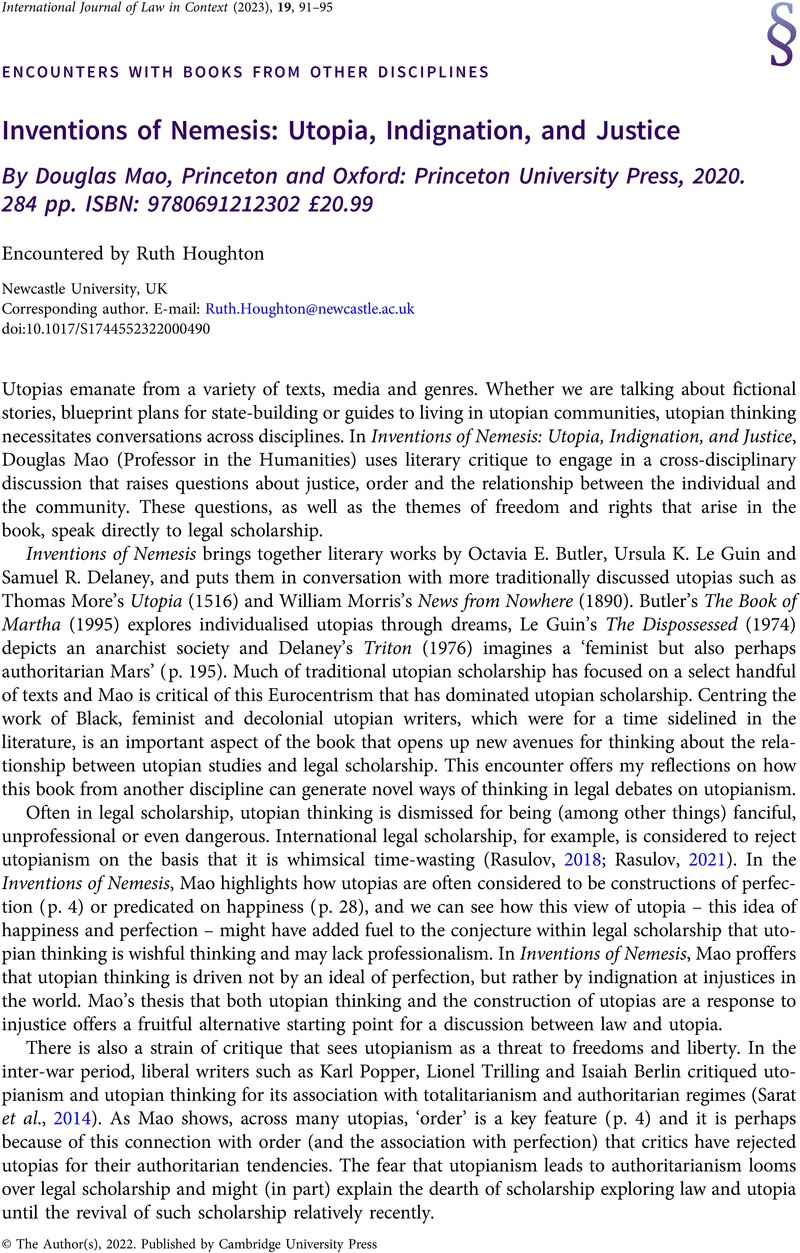No CrossRef data available.
Article contents
Inventions of Nemesis: Utopia, Indignation, and Justice By Douglas Mao, Princeton and Oxford: Princeton University Press, 2020. 284 pp. ISBN: 9780691212302 £20.99
Review products
Inventions of Nemesis: Utopia, Indignation, and Justice By Douglas Mao, Princeton and Oxford: Princeton University Press, 2020. 284 pp. ISBN: 9780691212302 £20.99
Published online by Cambridge University Press: 03 October 2022
Abstract
An abstract is not available for this content so a preview has been provided. Please use the Get access link above for information on how to access this content.

- Type
- Encounters with Books from Other Disciplines
- Information
- International Journal of Law in Context , Volume 19 , Special Issue 1: Algorithmic Law in Context , March 2023 , pp. 91 - 95
- Copyright
- Copyright © The Author(s), 2022. Published by Cambridge University Press
References
Hexter, J (1952) More's Utopia: The Biography of an Idea. Princeton: Princeton University Press.Google Scholar
Houghton, R and O'Donoghue, A (2020) ‘Ourworld’: a feminist approach to global constitutionalism. Global Constitutionalism 9, 38–75.CrossRefGoogle Scholar
Imarisha, W and brown am (eds) (2015) Octavia's Brood: Science Fiction Stories from Social Justice Movements. California: AK Press.Google Scholar
Jacoby, R (2005) Picture Imperfect: Utopian Thought for an Anti-utopian Age. New York: Columbia University Press.Google Scholar
Johns, A (2010) Feminism and utopianism. In Claeys, G (ed.), The Cambridge Companion to Utopian Literature. Cambridge: Cambridge University Press, pp. 174–199.CrossRefGoogle Scholar
Lino, D (2018) The rule of law and the rule of empire: A.V. Dicey in imperial context. Modern Law Review, 81, 739–764.CrossRefGoogle Scholar
McGlynn, C and Westmarland, N (2019) Kaleidoscopic justice: sexual violence and victim-survivors’ perceptions of justice. Social & Legal Studies 28, 179–201.CrossRefGoogle Scholar
Moylan, T (2022) Becoming Utopian: The Culture and Politics of Radical Transformation. London: Bloomsbury.Google Scholar
Rasulov, A (2018) The utopians. In d'Aspremont, J and Singh, S (eds), Concepts for International Law: Contributions to Disciplinary Thought. Cheltenham: Edward Elgar, pp. 879–899.Google Scholar
Rasulov, A (2021) ‘From the wells of disappointment’: the curious case of the international law of democracy and the politics of international legal scholarship. European Journal of International Law 32, 17–47.Google Scholar
Sarat, A, Douglas, L and Umphrey, MM (eds) (2014) Law and the Utopian Imagination. Redwood City, CA: Stanford University Press, Stanford Law Books.CrossRefGoogle Scholar
van der Welt, J (2014) Law, utopia, event: a constellation of two trajectories. In Sarat, A, Douglas, L and Umphrey M, Merrill (eds), Law and the Utopian Imagination. Redwood City, CA: Stanford University Press, Stanford Law Books, pp. 60–100.CrossRefGoogle Scholar


